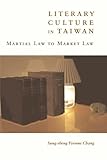Literary Culture in Taiwan : Martial Law to Market Law / Sung-sheng Yvonne Chang.
Material type: TextPublisher: New York, NY : Columbia University Press, [2004]Copyright date: ©2004Description: 1 online resource (288 p.)Content type:
TextPublisher: New York, NY : Columbia University Press, [2004]Copyright date: ©2004Description: 1 online resource (288 p.)Content type: - 9780231132343
- 9780231507127
- 895.1509951249 22
- PL3031.T3 C4468 2004eb
- online - DeGruyter
- Issued also in print.
| Item type | Current library | Call number | URL | Status | Notes | Barcode | |
|---|---|---|---|---|---|---|---|
 eBook
eBook
|
Biblioteca "Angelicum" Pont. Univ. S.Tommaso d'Aquino Nuvola online | online - DeGruyter (Browse shelf(Opens below)) | Online access | Not for loan (Accesso limitato) | Accesso per gli utenti autorizzati / Access for authorized users | (dgr)9780231507127 |
Browsing Biblioteca "Angelicum" Pont. Univ. S.Tommaso d'Aquino shelves, Shelving location: Nuvola online Close shelf browser (Hides shelf browser)

|

|

|

|

|

|

|
||
| online - DeGruyter The Police Power : Patriarchy and the Foundations of American Government / | online - DeGruyter The Columbia Guide to Online Style / | online - DeGruyter The Columbia History of Jews and Judaism in America / | online - DeGruyter Literary Culture in Taiwan : Martial Law to Market Law / | online - DeGruyter Not Ours Alone : Patrimony, Value, and Collectivity in Contemporary Mexico / | online - DeGruyter When Heroes Love : The Ambiguity of Eros in the Stories of Gilgamesh and David / | online - DeGruyter Coparticipant Psychoanalysis : Toward a New Theory of Clinical Inquiry / |
Frontmatter -- Contents -- Preface -- Acknowledgments -- Introduction -- Part 1 -- Chapter 1. Academic Contexts and Conceptual Frameworks -- Chapter 2. Political and Market Factors in the Literary Field -- Part 2 -- Chapter 3. Soft-Authoritarian Rule and the Mainstream Position -- Chapter 4. The Modernist Trend and Aestheticization of the "China Trope" in Mainstream Literature -- Chapter 5. Localist Position as a Product of Social Opposition -- Part 3 -- Chapter 6. Fukan-Based Literary Culture and Middle-Class Genres -- Chapter 7. High Culture Aspirations and Transformations of Mainstream Fiction -- Chapter 8. New Developments in the Post-Martial Law Period -- Notes -- Selected Bibliography -- Index
restricted access online access with authorization star
http://purl.org/coar/access_right/c_16ec
With monumental changes in the last two decades, Taiwan is making itself anew. The process requires remapping not only the country's recent political past, but also its literary past. Taiwanese literature is now compelled to negotiate a path between residual high culture aspirations and the emergent reality of market domination in a relatively autonomous, increasingly professionalized field. This book argues that the concept of a field of cultural production is essential to accounting for the ways in which writers and editors respond to political and economic forces. It traces the formation of dominant concepts of literature, competing literary trends, and how these ideas have met political and market challenges.Contemporary Taiwanese literature has often been neglected and misrepresented by literary historians both inside and outside of Taiwan. Chang provides a comprehensive and fluent history of late twentieth-century Taiwanese literature by placing this vibrant tradition within the contexts of a modernizing local economy, a globalizing world economy, and a postcolonial and post-Cold War world order.
Issued also in print.
Mode of access: Internet via World Wide Web.
In English.
Description based on online resource; title from PDF title page (publisher's Web site, viewed 02. Mrz 2022)


